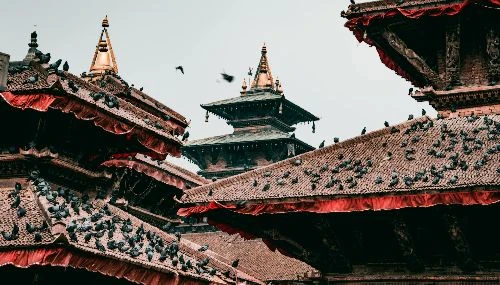Bhutan is a destination like no other, where tradition and modernity coexist harmoniously and the pursuit of happiness is a national priority. It’s a country with deep-rooted traditions and customs that the locals cherish.
The Bhutanese people have managed to preserve their culture in ways that are truly admirable, and as a visitor, it’s very important to show respect and appreciation for this during your Bhutan travel. So, before you pack your bags, it’s worth learning a bit of cultural etiquette.
In Bhutan, modesty is more than just a dress code; it’s a way of life. The Bhutanese are deeply spiritual, with Buddhism influencing almost every aspect of their daily lives. Temples and monasteries are sacred spaces where a certain level of decorum is expected, but the respect goes beyond just the physical space.
The way you speak, the gestures you use, and even how you interact with nature all play a role in showing respect for Bhutanese culture. It’s about being mindful, present, and showing that you understand the value of their traditions.
Now, don't stress about it - you don't always have to be super cautious. The Bhutanese are known for their kindness and hospitality, so as long as you’re polite and open-minded, you’ll be just fine.
Plus, learning about these customs before you go can actually enhance your experience. You’ll find yourself connecting more deeply with the people and the places you visit, making your trip that much more meaningful.
In this blog, we’ll walk through the do’s and don’ts of Bhutanese cultural etiquette, covering everything from how to dress and behave in religious sites to interacting with locals and respecting the environment.
Dress Modestly
When you’re in Bhutan, dressing modestly is very important, especially when you’re visiting religious sites like temples, monasteries, and dzongs. The general rule is to cover your arms and legs. It’s about showing respect, and it’s a custom deeply ingrained in Bhutanese society. If you're ever unsure, it's always a good idea to play it safe by wearing long sleeves and pants or skirts that go down to your ankles.
If you’re lucky enough to attend a formal event or one of the many incredible festivals, you might even want to try the traditional Bhutanese attire. Men wear a “Gho,” and women wear a “Kira.”
Bhutanese people take great pride in their traditional attire, and as a visitor, it’s important to dress appropriately. It’s a way of showing that you’re not just a tourist, but someone who’s genuinely interested in their culture and respects it.

Respect Religious Sites and Practices
Bhutan is home to countless monasteries, stupas, and temples that hold great religious significance. When visiting these sites, it is important to show the utmost respect. Before entering a temple or monastery, always remove your shoes. This is a sign of respect and cleanliness.
When circumambulating a stupa or chorten or any kind of Buddhist monument, always walk clockwise. This is a traditional practice that shows respect for the sacred site. Avoid touching or leaning on religious artifacts, statues, or paintings. These items are considered sacred and should not be handled by visitors.
Many religious sites require visitors to maintain silence or speak in hushed tones. This is especially important during prayer times or when monks are chanting. And if you’re sitting down, make sure your feet aren’t pointed towards any sacred objects.
Practice Bhutanese Greeting Etiquette
The traditional Bhutanese greeting is known as "Kuzu Zangpo La," which means "Hello" or "Good day." While shaking hands is becoming more common in urban areas, the traditional greeting involves a slight bow with hands folded in a prayer position at chest level. This gesture is a sign of respect.
Mind Your Language and Gestures
The Bhutanese are incredibly polite, and they appreciate the same in return. Keep your language soft and your tone gentle. Loud or disruptive behavior is considered impolite. Whether you’re in a public place, religious site, or private home, it’s important to maintain a calm and respectful demeanor.
When you meet someone, especially an elder, a slight bow and a warm “Kuzuzangpo” (hello) is a sign of respect. Use both hands when giving or receiving something, it’s a sign of respect. And while the locals are friendly, remember to keep a level of formality, especially with elders or those in authority.
Not to forget, public displays of affection aren’t really a thing in Bhutan, so keep those gestures private. When pointing, use your whole hand or your thumb instead of just a finger, as pointing directly can be seen as rude.
Likewise, In Bhutanese culture, the feet are considered the lowest and least clean part of the body. Pointing your feet at someone, especially a monk or elder, is seen as disrespectful. Similarly, avoid pointing your feet at religious objects, such as statues or altars, as this is considered highly offensive.
Photography Etiquette
We all love capturing memories, but in Bhutan, it’s important to do so respectfully. Always ask before taking someone’s photo, and be extra mindful of religious sites. Some places strictly prohibit photography, especially inside temples or monasteries. Signs will usually let you know, but when in doubt, ask.
Before taking photos of people, especially monks or religious ceremonies, always ask for permission. Some individuals may not wish to be photographed, and it’s important to respect their wishes.
In many religious sites, flash photography is prohibited as it can damage ancient artifacts and murals. Be sure to check the rules before taking photos inside temples or monasteries. Always follow the guidelines provided by your guide or the site’s authorities.
Follow Proper Dining Etiquette
Dining in Bhutan lets you experience the local cuisine and hospitality. However, there are certain customs to be aware of when sharing a meal with Bhutanese people.
Wait to Be Served: In Bhutan, it’s customary to wait for the host to begin eating before you start. This shows respect for the host and the meal that has been prepared.
Use Your Right Hand: When eating with your hands, use your right hand to take food from the communal dishes. The left hand is considered unclean and should not be used to serve or eat food.
Express Gratitude: After a meal, it’s polite to express your gratitude by saying "Kaadinchey la," which means "Thank you." This shows appreciation for the meal and the hospitality you’ve received.
Decline Politely: If you’ve had enough to eat, it’s customary to decline additional servings politely. You can say "Tse mayang," which means "I’ve had enough." Finish your plate and do not waste food. Otherwise, it’s a sign of not appreciating the host and meals.
Don't Leave Chopsticks Sticking Upright in Food: In Bhutanese culture, as well as in many other Asian cultures, leaving chopsticks sticking upright in food, particularly in a bowl of rice, is considered highly disrespectful and is associated with death and funerals. To avoid this, always place your chopsticks parallel to the table when you’re done eating. You can rest them on a chopstick holder, the edge of your plate or bowl, or even lay them across the top of your bowl.

Respect Bhutanese Customs and Traditions
Bhutan is a country steeped in tradition, and many of these customs are still practiced today.
Participate in Festivals: Bhutan is known for its unique festivals, or “Tshechus”, which are held throughout the year. Visitors are welcome to attend these festivals, but it’s important to respect the rituals and performances. Dress appropriately and avoid interrupting or disturbing the ceremonies.
Respect the Royal Family: The Bhutanese people hold their King and the Royal Family in high regard. Any negative comments or disrespectful behavior towards the monarchy are considered highly offensive. As a visitor, it’s important to be mindful of this and avoid negatively discussing the Royal Family.
When you see their images, which are displayed in many places, it’s a good idea to show your respect, too. Stand when the national anthem is played, and always speak with admiration when discussing the monarchy. Avoid bringing up sensitive political topics, as it’s best to steer clear of potentially controversial subjects.
Be Environmentally Conscious
Bhutan is committed to protecting the environment, and you can see that in how they are strict about managing waste and being eco-friendly. As a visitor, you should too.
This country has a strict policy on littering, and it’s important to carry out any trash you generate. Many places do not have public trash bins, so be prepared to take your waste with you until you find a proper disposal site.
It also places a high value on conserving natural resources. Be mindful of your water and energy usage, and avoid wasting resources unnecessarily. Stick to eco-friendly practices–use reusable water bottles, and don’t disturb the wildlife.
If you’re hiking, stay on the trails to protect the environment, and whatever you do, don’t litter. Bhutan is known for being incredibly clean, and it’s up to everyone to help keep it that way.
Support Local Artisans and Businesses
Bhutan is known for its traditional arts and crafts, including weaving, painting, and woodcarving. Supporting local artisans not only helps preserve these traditional skills but also contributes to the local economy.
When purchasing souvenirs, look for items that are handmade by local artisans. These items are often of higher quality and have greater cultural significance.
While bargaining is common in some countries, it is not a widespread practice in Bhutan. If you do negotiate a price, do so respectfully and be mindful that the price usually shows how much time and effort was put into making the item.
General Social Etiquette
When visiting someone’s home, it’s customary to remove your shoes at the door. Bringing a small gift, like fruit or sweets, is also a nice gesture. When sitting, try not to point your feet at others, and never touch someone’s head.
The head is considered the most sacred part of the body in Bhutanese culture, and touching someone’s head, especially a child’s, is considered disrespectful. This gesture is particularly offensive in religious contexts, where the head is often associated with spiritual purity.
Tipping and Giving Gifts
Tipping isn’t traditionally Bhutanese, but it’s become more common in the tourism industry. If you’re happy with the service, a small tip is appreciated, but it’s not expected. When giving gifts, especially to monks or at monasteries, think of something useful or symbolic, like prayer flags or incense.
And try to avoid giving money directly to children; donating to local schools or community projects is a better option.
Respecting Local Wildlife
Bhutan is home to a diverse range of wildlife, including the rare black-necked crane. If you’re lucky enough to spot wildlife, observe them quietly from a distance.
Disturbing or feeding animals is discouraged. If you’re hiking or visiting a national park, stick to designated paths and avoid disturbing the natural habitats of animals.
Do Not Smoke in Public Places
Smoking is heavily regulated in Bhutan, and it is illegal to smoke in public places, including streets, parks, and religious sites. Smoking is only permitted in designated smoking areas, and it’s important to adhere to these regulations to avoid fines or legal consequences.
By following Bhutanese etiquette like dressing modestly, respecting religious practices, and supporting local crafts, you’re not just being polite; you’re making your visit more enjoyable and showing that you care about their way of life. Every small gesture counts, whether it’s being respectful in temples or taking care of the environment.
So, as you get ready for your trip, remember to be respectful and open-minded. Take the time to enjoy the slower pace of life, interact with the locals, and appreciate the traditions and natural beauty around you.
.webp)

.webp)

